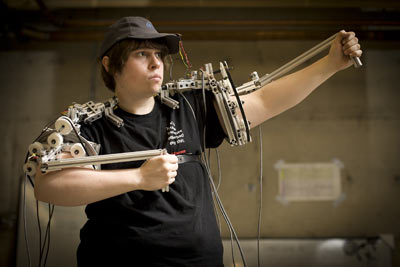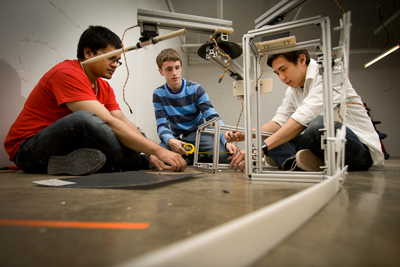Engineering students feature game-playing, ball-launching robots at Cornell Cup
By Anne Ju


About 30 Cornell engineering students boarding an all-night bus to Walt Disney World in early May will have some unusual companions: six squat, multidirectional wheeled robots and three humanoids (sitting in their own seats) primed to beat any challenger at the Xbox game Rock Band.
The students, part of the Cornell Cup engineering team, will play host to 22 university student teams vying for cash prizes at the inaugural Cornell Cup USA, presented by Intel. The competition will take place May 4-5 at Walt Disney World, Lake Buena Vista, Fla.
The Cornell Cup challenges student engineers to innovate, design and execute a useful application of "embedded technology" -- the small-scale technologies that pervade our lives in cellphones, iPads and other devices. All entries, which range from a solar-powered drone to a robotic dog waste-remover, must incorporate the Intel Atom chip, a commercial microprocessor that already powers many small devices.
The Intel-sponsored competition, which is modeled after the successful Intel Cup China, allows student designers to dream up their own applications for embedded technologies. The students are expected to bring their creative spirit, but also their best efforts at professional design using systems engineering concepts, explained David Schneider, lecturer in Cornell Systems Engineering and Cornell Cup lead organizer.
Professional design involves everything from describing a solution to meeting a need, as well as built-in evaluation and risk analysis. "The competition really encourages them to think in this way," Schneider said.
The Cornell students are not competing, but they are demonstrating the best of Cornell's already storied systems engineering and robotics expertise. Bringing together students from electrical engineering, mechanical engineering, computer science and, of course, systems engineering, the students have spent the last year designing several robotic platforms, which they will demo during the competition.
Three humanoid robots, with movements controlled by a human wearing a puppet suit, will be connected to a computing platform that can play the game Rock Band at 99 percent accuracy at the "expert" level -- no small feat for even the most practiced gamers. During the competition, the Cornell students will welcome people to challenge the Rock Band robots head-to-head.
And six modular robots, or modbots, will demonstrate a basic platform for robots that can move multidirectionally and execute different tasks. In the Cornell bots' case, they will be equipped with ball launchers set to different speeds and trajectories, to show how objects can be thrown and caught.
The demo robots are meant to give other students simple platforms that they can then springboard for their own projects.
"The purpose of the modular design is any team can use it as a nice starting point," said Jim Kehoe '12, a student leader on the mechanical engineering subteam.
Media Contact
Get Cornell news delivered right to your inbox.
Subscribe